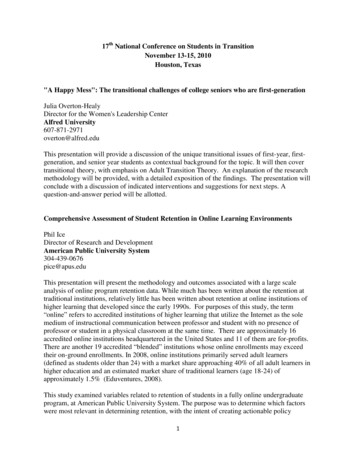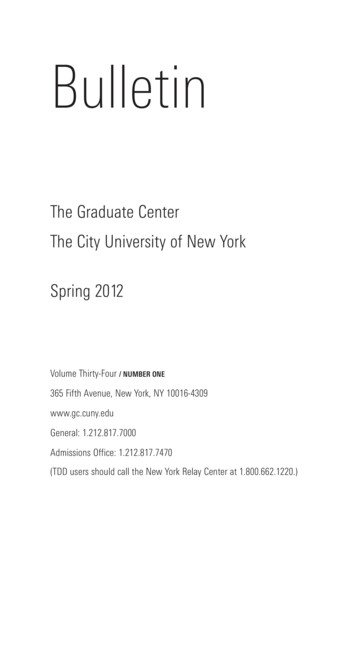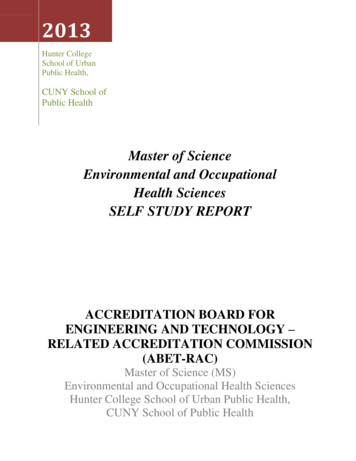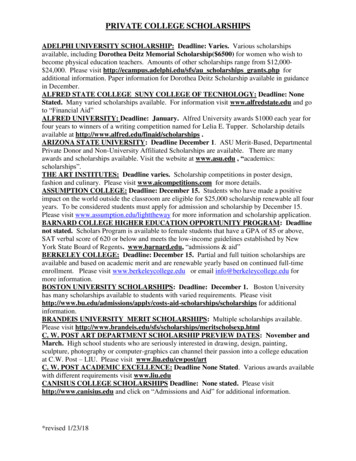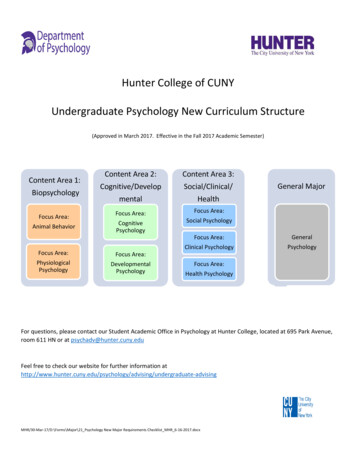
Transcription
Hunter College of CUNYUndergraduate Psychology New Curriculum Structure(Approved in March 2017. Effective in the Fall 2017 Academic Semester)Content Area 1:BiopsychologyFocus Area:Animal BehaviorContent Area 2:Content Area us Area:Focus Area:CognitivePsychologyFocus Area:Focus yGeneral MajorSocial PsychologyFocus Area:GeneralClinical PsychologyPsychologyFocus Area:Health PsychologyFor questions, please contact our Student Academic Office in Psychology at Hunter College, located at 695 Park Avenue,room 611 HN or at psychadv@hunter.cuny.eduFeel free to check our website for further information 21 Psychology New Major Requirements Checklist MHR 6-16-2017.docx
Roadmap to the Psychology Major Requirements (Approved in March 2017. Effective in the Fall 2017 semester)Natural SciencesCourses8 creditsFoundationalCourses9 creditsCourseCompletedEnrolledNotesPSYCH 10000 (3 cr)*Need a grade of B- or better.Choose one (1) of one of the following (3 cr)PSYCH 14000, 15000, 16000, 17000, 17100, 18000 or PSYCH 19000*Need a grade of B- or better.*Need a GPA of 2.0 or betterSTAT 11300- Elementary Probability & Statistics (3 cr)ORMATH 12500-Precalculus, 12000, or 15000 (3 cr)*Need a grade of C or better or CR* You MUST have completed at leastONE (1) Laboratory Science ClassBEFORE taking PSYCH 25000.* You need a total of TWO (2) NaturalSciences WITH Labs in order tograduate.* *Must have completed both the LectureAND the Lab with a passing grade forCHEM.* Taken after the MATH Requirement.*Need a grade of C or betterChoose two (2) Natural Science courses WITH Lab from the list below (4 crEACH)ANTHP 101, 102; ASTRO 100/102, 100/107; or ASTRO 101; BIO 100, 102, 120,122, 125, 150; GEOL 100/101; GEOL 101, 102; PGEOG 130, 231; PHYS 110, 120CHEM 102, 104/106PSYCH 24800-Statistics (4 cr)Psychology Major Courses29 creditsPSYCH 24900 or 25000-Experimental Psychology (4 cr)* Taken after PSYCH 24800*Need a grade of C or better.All students must take three (3) 200-level courses, one in each of the three Content Areas: Biopsychology, Cognitive/Developmental, and Social/Clinical/Health (9 cr).One (1) of these three courses must be taken within the student’s chosen Focus Area. Students who wish to pursue a focused course of study should include theappropriate 200-level course for that Focus Area. If no Focus Area is chosen, then students will be automatically assigned to the ‘General Psychology’ Focus Area andwill need to take these courses from each of the other Focus Areas.Content Area: BiopsychologyContent Area: Cognitive/DevelopmentalContent Area: Social/Clinical/Health lledCompletedEnrolled⃝ Focus Area⃝ Focus Area⃝ Focus AreaAnimal BehaviorCognitiveSocialPsychologyPsychologyPSYCH 225PSYCH 243 orPSYCH nrolled⃝ Focus Area⃝ Focus Area⃝ Focus ychologyPsychologyPSYCH 224PSYC 210, 213PSYCH 223CompletedEnrolled⃝ Focus AreaHealthPsychologyPSYCH 242Two (2) 300-level courses (6cr)Students pursing a focused course of study must take two (2) 300-level courses in their chosen Focus Area of Psychology. Students selecting ‘General Psychology’ astheir focus can take these courses from any of the other Focus Area.Content Area: BiopsychologyContent Area: Cognitive/DevelopmentalContent Area: Social/Clinical/Health lledCompletedEnrolled⃝ Focus Area⃝ Focus Area⃝ Focus AreaAnimal BehaviorCognitiveSocialPsychologyPsychologyPSYCH 320, 321,324 or 381PSYCH 316, 322,PSYCH 313, 331,324, 325, 328,332, 333, 334, 335329, 330, 331,or 385350, 370, or lled⃝ Focus Area⃝ Focus Area⃝ Focus ychologyPsychologyPSYCH 30000,PSYCH 310, 313,PSYCH 306, 307,30100, 30900,315, 323, 332,323, 326, 341, 342,31600, 32100,333, 334, 361,344, 361, or 38632700, 36900, or370, or 384CompletedEnrolled⃝ Focus Area38200HealthPsychologyPSYCH 362, 363,364, 365, 366, 367,or 387CompletedEnrolledNotesTwo (2) electives at the 200 or 300-level (6 cr)PSYCH 201, 212, 214, 220, 235, 348, 395, 396, and 398 may be used as Electivesonly as they do not satisfy the requirement of the Focus Areas category above.General PsychologyNotes:Total Credits required for the Psychology Major Degree (Including Foundational courses AND Natural Sciences courses): 9 8 29 46 creditsMHR/30-Mar-17/D:\Forms\Major\21 Psychology New Major Requirements Checklist MHR 6-16-2017.docx
Content and Focus Areas within the Psychology Major (Approved in March 2017.Cognitive/Developmental Content AreaBiopsychology Content AreaIntroductoryPsychology CoursesAnimal Behavior FocusAreaPhysiologicalPsychology Focus AreaCognitive PsychologyFocus AreaDevelopmentalPsychology Focus AreaSocial/Clinical/Health Content AreaSocial Psychology FocusAreaPSYCH 10000-Introduction to PsychologyPSYCH 14000-Psychological AdjustmentPSYCH 15000- Human DevelopmentPSYHC 16000-Evolution and BehaviorPSYCH 22500-EthologyPSYCH 22400-NeurosciencePSYCH 24300-Cognitive ProcessesPSYCH 21000-Child DevelopmentPSYCH 21200-Exceptional ChildhoodsPSYCH-21300-Children and Adolescents withAutismPSYCH 21400-Adults with DevelopmentalDisabilitiesPSYCH 22000-PersonalityPSYCH 23000-Social PsychologyPSYCH 23500-Psychology of WomenClinical PsychologyFocus AreaPSYCH 22300-Abnormal PsychologyHealth PsychologyFocus AreaPSYCH 24200 Health PsychologyNon-Classified Electives(do not serve as a prerequisite for 300-levelcourses)Department HonorsPSYCH 20100-Independent StudyPSYCH 29500-Special Topics in NeuroscienceEffective in the Fall 2017 semester)PSYCH 17000- Psychology of Human SexualityPSYCH 17100- ?PSYCH 18000-Brain and BehaviorPSYCH 19000-Development of Gender RolesPSYCH 32000-Neuronal Basis of BehaviorPSYCH 32100-Animal OrientationPSYCH 32400-Communication BehaviorPSYCH 32500-Animal CognitionPSYCH 38100-Current Topics in Animal BehaviorPSYCH 30000-Physiological PsychologyPSYCH 30100-Sensation and PerceptionPSYCH 30900-Behavioral NeuroendocrinologyPSYCH 31600 Cognitive NeurosciencePSYCH 32100-Animal OrientationPSYCH 32700-Motivation and EmotionPSYCH 36900-Behavioral PharmacologyPSYCH 38200-Current Topics in BiopsychologyPSYCH 31600-Cognitive NeurosciencePSYCH 32200-Psychology of LanguagePSYCH 32400-Communication BehaviorPSYCH 32500-Animal CognitionPSYCH 32800-States of ConsciousnessPSYCH 32900-Cognitive SciencePSYCH 33000-Memory and AttentionPSYCH 33100-Social Cognition of GenderPSYCH 35000-LearningPSYCH 37000-Cognitive DevelopmentPSYCH 38300-Current Topics in Cognitive PsychologyPSYCH 31000-Research in Developmental PsychologyPSYCH 31300-AdolescencePSYCH 31500-Adult DevelopmentPSYCH 32300-Developmental PsychopathologyPSYCH 33200-Attitudes and PersuasionPSYCH 33300-Advanced Social Psychology Theory and MethodsPSYCH 33400-Cultural PsychologyPSYCH 36100-Psychological TestingPSYCH 37000-Cognitive DevelopmentPSYCH 38400-Current Topics in Developmental PsychologyPSYCH 31300-AdolescencePSYCH 33100-Social Cognition of GenderPSYCH 33200-Attitudes and PersuasionPSYCH 33300-Advanced Social Psychology Theory and MethodsPSYCH 33400-Cultural PsychologyPSYCH 33500- Ethnic and Cultural Identity TheoriesPSYCH 38500-Current Topics in Social PsychologyPSYCH 30600-Seminar-Psychological Services IPSYCH 30700-Seminar- Psychological Services IIPSYCH 32300-Developmental PsychopathologyPSYCH 32600-Psychoanalytical TheoriesPSYCH 34100-Stress, Trauma, and ResiliencePSYCH 34200-Emotion: Function and DysfunctionPSYCH 34400-Clinical PsychologyPSYCH 36100-Psychological TestingPSYCH 38600-Current Topics in Clinical PsychologyPSYCH 36200–Psychological Determinants of Health DisparitiesPSYCH 36300-Health Behavior ChangePSYCH 36400-Sexuality and HealthPSYCH 36500-Coping with Chronic DiseasePSYCH 36600-Interpersonal Relationships and HealthPSYCH 36700-Additive BehaviorsPSYCH 38700-Current Topics in Health PsychologyPSYCH 34800-Statistics Practicum in StatisticsPSYCH 39500-Psychology Independent ResearchPSYCH 39600-Psychology Independent ResearchPSYCH 39800-Psychology Independent ResearchMHR/30-Mar-17/D:\Forms\Major\21 Psychology New Major Requirements Checklist MHR 6-16-2017.docx
Requirements for the Psychology Degree Program:Declaration of Major/Foundational Classes:To declare a Psychology Major, the student must have completed PSYCH 10000-Introduction to Psychology and any other 100-level Psychologycourse with a minimum grade of B, a required Mathematics course with a minimum grade of C or CR and have a minimum GPA of 2.00. TheMathematics requirement may be satisfied by the following, or by earning exemption from the Mathematics requirement. The Major must bedeclared in person with an Undergraduate Psychology Adviser (Room 611 HN - Refer to website http://hunter.cuny.edu/psychology forschedule.) The student must bring his/her Hunter transcript (and where relevant, transcripts from all other colleges attended) when meeting withthe adviser to declare a Psychology Major. STAT 11300 - Elementary Probability and Statistics-or- MATH 12500 - PrecalculusTwo Sciences with LabStudents may declare a Focus Area at the time of declaring the Major, or at any time thereafterPsychology Major:The Psychology Major is organized around three (3) Content Areas, consisting of seven (7) Focus Areas. The Major consists of 29 credits inPsychology courses above the 100-level, including PSYCH 24800-Statistical Methods in Psychological Research and PSYCH 24900-ExperimentalPsychology: Social or PSYCH 25000-Experimental Psychology: General.The Psychology Major consists of a total of 46 credits including Foundation and Natural Sciences courses. The Major also requires: One of: PSYCH 14000, 15000, 16000, 17000, 17100, 18000, or 19000. Three 200-level courses, one in each of three Content Areas (see below). One of these 3 courses must be within the Focus Area chosen bythe student (i.e. Animal Behavior; Physiological Psychology; Cognitive; Developmental; Social Psychology; Clinical Psychology; or HealthPsychology). (Students selecting ‘General Psychology’ as their Focus Area can take these courses from any Focus Area.) Two 300-level courses within a Focus Area of Psychology and 2 electives (200- or 300-level courses) are required. (Students selecting‘General Psychology’ as their focus can take these courses from any Focus Area.)Our Major is organized around three Content Areas and their corresponding Focus Areas. The Content Areas and corresponding Focus Areas areon the following page. At least 50% of all Major and Minor credits must be taken at Hunter.Once your Psychology Major is declared, you cannot take PSYCH classes at any other institution.Psychology courses taken on a Credit/Non-Credit basis may not be applied toward the Major.The sequence below must be followed:1.2. Fulfill the MATH Requirement by:Getting a C or higher (or CR) in STAT 11300, MATH 12500, 12000, or 15000, or Passing scores on Parts 3, 4, and 5 ofthe CUNY Mathematics Skills Assessment Test (consult the Mathematics Department for further information on theCUNY Mathematics Skills Assessment Test). Declare your PSYCH Major after you:Get a B- or higher in ALL PSYCH 100-level course and an overall GPA of at least 2.0.3.Take PSYCH 24800 for a grade. It may not be taken on a Credit/Non-Credit basis4.Take PSYCH 25000Psychology courses taken on a Credit/No Credit basis may not be applied toward the MajorIf a course meets requirements for more than one Focus Area, the student may apply the course to only one of them.MHR/30-Mar-17/D:\Forms\Major\21 Psychology New Major Requirements Checklist MHR 6-16-2017.docx
A.BiopsychologyAnimal BehaviorPSYCH 22500-EthologyPSYCH 32000-Neuronal Basis of BehaviorPSYCH 32100-Animal OrientationPSYCH 32400-Communication BehaviorPSYCH 38100-Current Topics in Animal BehaviorPhysiological PsychologyPSYCH 22400-NeurosciencePSYCH 30000-Physiological PsychologyPSYCH 30100-Sensation and PerceptionPSYCH 30900-Behavioral NeuroendocrinologyPSYCH 31600 Cognitive NeurosciencePSYCH 32100-Animal OrientationPSYCH 32700-Motivation and EmotionPSYCH 36900-Behavioral PharmacologyPSYCH 38200-Current Topics in BiopsychologyB.Cognitive/Developmental PsychologyCognitive PsychologyPSYCH 24300-Cognitive ProcessPSYCH 31600-Cognitive NeurosciencePSYCH 32200-Psychology of LanguagePSYCH 32400-Communication BehaviorPSYCH 32500-Animal CognitionPSYCH 32800-States of ConsciousnessPSYCH 32900-Cognitive SciencePSYCH 33000-Memory and AttentionPSYCH 33100-Social CognitionPSYCH 35000-LearningPSYCH 37000-Cognitive DevelopmentPSYCH 38300-Current Topics in Cognitive PsychologyDevelopmental PsychologyPSYCH 21000-Child DevelopmentPSYCH 21200-Exceptional ChildhoodsPSYCH-21300-Children and Adolescents with AutismPSYCH 21400-Adults with Developmental DisabilitiesPSYCH 31000-Research in Developmental PsychologyPSYCH 31300-AdolescencePSYCH 31500-Adult DevelopmentPSYCH 32300-Developmental PsychopathologyPSYCH 33200-Attitudes and PersuasionPSYCH 33300-Advanced Social Psychology Theory andMethodsPSYCH 33400-Cultural PsychologyPSYCH 36100-Psychological TestingPSYCH 3700-Cognitive DevelopmentPSYCH 38400-Current Topics in Developmental PsychologyC.Social/Clinical/Health PsychologySocial PsychologyPSYCH 22000-PersonalityPSYCH 23000-Social PsychologyPSYCH 23500-Psychology of Women***PSYCH 31300-AdolescencePSYCH 33100-Social Cognition of GenderPSYCH 33200-Attitudes and PersuasionPSYCH 33300-Advanced Social Psychology Theory andMethodsPSYCH 33400-Cultural PsychologyPSYCH 33500- Ethnic and Cultural Identity TheoriesPSYCH 38500-Current Topics in Social PsychologyClinical PsychologyPSYCH 22300-Abnormal PsychologyPSYCH 32300-Developmental PsychopathologyPSYCH 32600-Psychoanalytical TheoriesPSYCH 34100-Stress, Trauma and ResiliencePSYCH 34200-Emotion: Function and DysfunctionPSYCH 34400-Clinical PsychologyPSYCH 36100-Psychological TestingPSYCH 38600-Current Topics in Clinical PsychologyHealth PsychologyPSYCH 24200-Health PsychologyPSYCH 36200-Psychological Determinants of HealthDisparitiesPSYCH 36300-Health Behavior ChangePSYCH 36400-Sexuality and HealthPSYCH 36500-Coping with Chronic DiseasePSYCH 36600-Interpersonal Relationships and HealthPSYCH 36700- Addictive BehaviorsPSYCH 38700-Current Topics in Health PsychologyNon-classified Electives (Cannot Be Applied In Focus Area)PSYCH 29568-71-Special Topics in Neuroscience – BPEndurancePSYCH 30600-Seminar-Psychological Services I** - may beapplied to the Clinical Focus AreaPSYCH 30700-Seminar-Psychological Services II** - may beapplied to the Clinical Focus AreaPSYCH 34800-Statistics Practicum in Statistics***PSYCH-27000 is equivalent to PSYCH-24300.** These classes do NOT count towards the Major.*** Only fulfills 200-level Content Area requirement. Does NOT serve as a prerequisite for 300-level courses.Qualified Undergraduates in their last semester may register for Graduate-level Psychology courses with the permission of the instructor andthe graduate adviser. Most Psychology majors intending to attend graduate school take more than 26 credits in Psychology and design theircourse of study in close consultation with a faculty mentor. Students should obtain a copy of “Psychology Major Requirements and Policies”from the undergraduate advising office as soon as they declare the major for up-to-date information on department resources, activities andfaculty research interests.MHR/30-Mar-17/D:\Forms\Major\21 Psychology New Major Requirements Checklist MHR 6-16-2017.docx
The Psychology Major is organized around three (3) Content Areas, consisting of seven (7) Focus Areas. The Major consists of 29 credits in Psychology courses above the 100-level, including PSYCH 24800-Statistical Methods in Psychological Research and PSYCH 24900-Experimental



